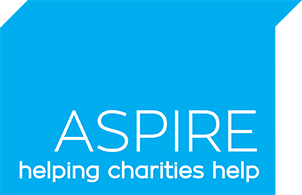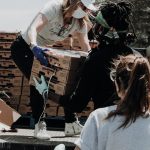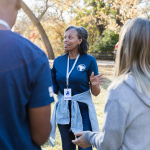The ASPIRE Barbados team would like to say a huge thank everyone who tuned in to our webinar last week, to share information and insight into the ASPIRE Incubator Programme and volunteer opportunities that are available to professionals like yourself.
We hope it was as exciting for you as it was for us! We are especially grateful to Ivan and Jeanette for sharing their personal experiences volunteering with the ASPIRE Incubator Programme. Their passion and enthusiasm can be felt through the screen.
Over 100 people tuned in to our webinar, and we are very grateful for the feedback we have received so far.
If you want to skip ahead, you can jump straight to our Volunteer Application Form.
Here’s a quick recap of what we discussed, as well as some of the questions you asked. Please note that this is an edited transcription of the conversation that took place during the webinar.
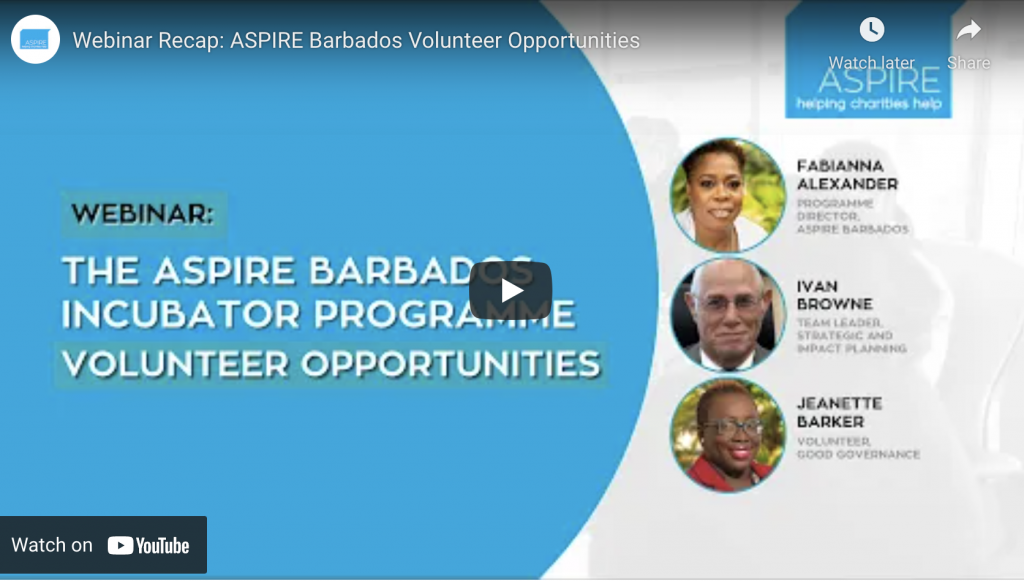
For those who were unable to make it, we have an edited recording of the webinar (Total time: 40 minutes) The video is fully captioned, with edited subtitles. You can watch it on YouTube the video.

WHAT IS ASPIRE BARBADOS?
ASPIRE Foundation (Barbados) Inc., also known as ASPIRE Barbados is a non-profit organization that was founded in 2015 by Mr. Peter Boos. We are a homegrown solution with international best practices in non-profit management and for the sustainability of non-profits. Mr. Boos has been a philanthropist for many years and had some challenges that he experienced over the years with working with non-profits. He sought to help fix those issues. After many months of developing the idea to create a charity support network, the idea for ASPIRE Barbados was birthed to really help to drive the sustainability of nonprofits and non-profit leaders in Barbados.

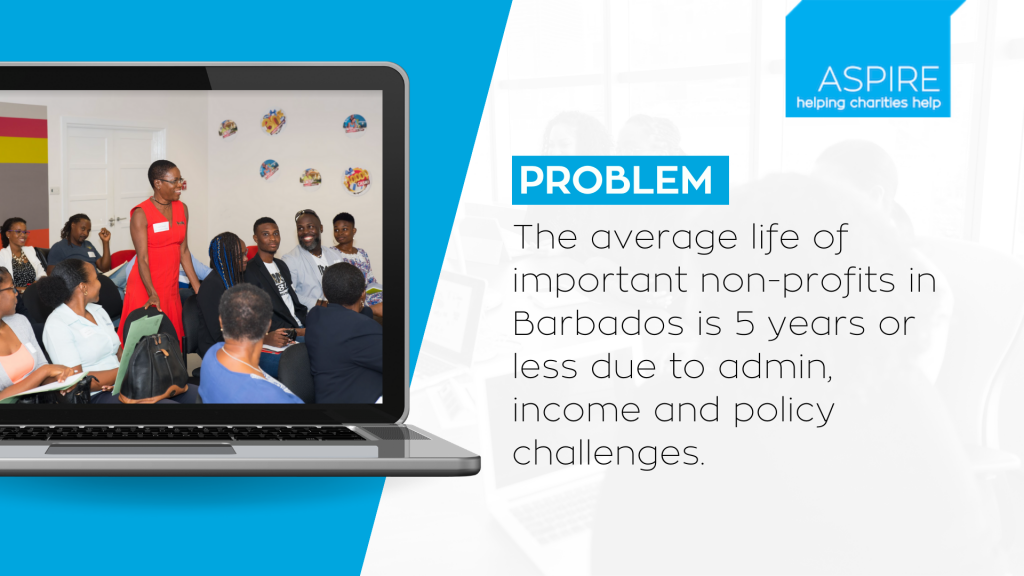
PROBLEM IDENTIFICATION AND OUR SOLUTION
With the birth of ASPIRE Barbados, we did some research and found that most nonprofits didn’t last. The problem that we are seeking to solve is that the average lifespan of nonprofits were 3-5 years and many of those issues were around problems with admin, income, income sustainability and policy challenges.
As we’ve run the organization over the last few years as we piloted it, we found that the underlying issue centres really deeply around income insecurity for non-profit leaders and the organizations they run, and not long-standing funding practices, which have been more detrimental to organizations. The solution is the Incubator Programme, which is aimed at helping organizations surpass those challenges.

We are a non-profit organization that helps non-profits to solve critical social and economic challenges in our communities. We do so by:
- Linking the non-profit leaders with skilled volunteers who share their expertise and pro bono support.
- Matching the organisations with social investors.
- Providing seed grant funding up to BDS$10,000 (US$5,000)
- Provide business support valued at a minimum of BDS$60,000 in pro bono services (US$30,000)
The goal is to boost sustainability and increase impact for the long term for organizations.
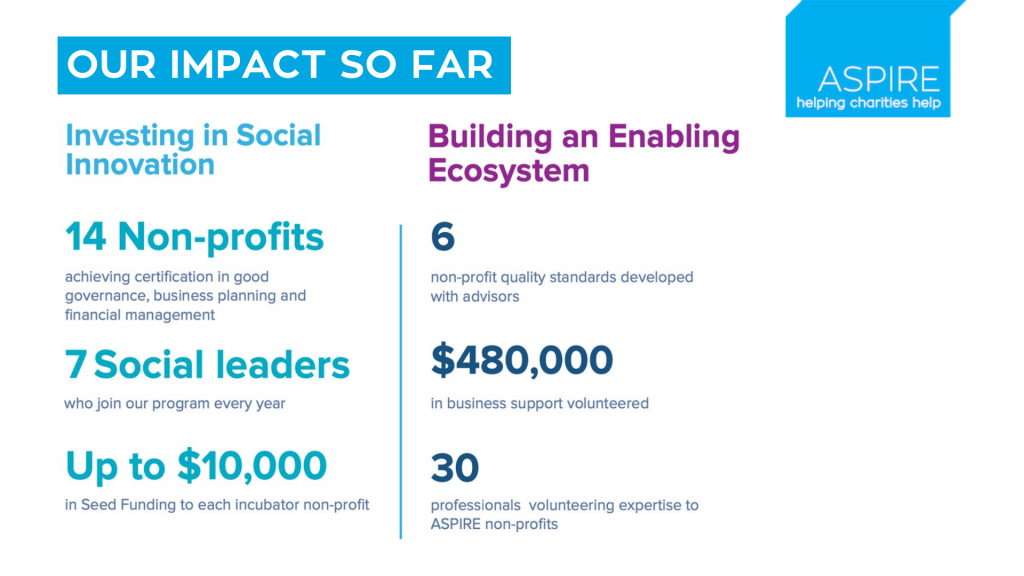
OUR IMPACT SO FAR
Over the last few years, we have:
- Worked with 14 social leaders leading 14 non-profits
- On an annual basis we the incubator takes in seven social leaders, seven organizations.
- Over the last 5 years the services that we have provided to nonprofits is in excess of BDS$480,000
- We’ve worked with over 30 professionals who provided these services all pro bono to the social leaders.
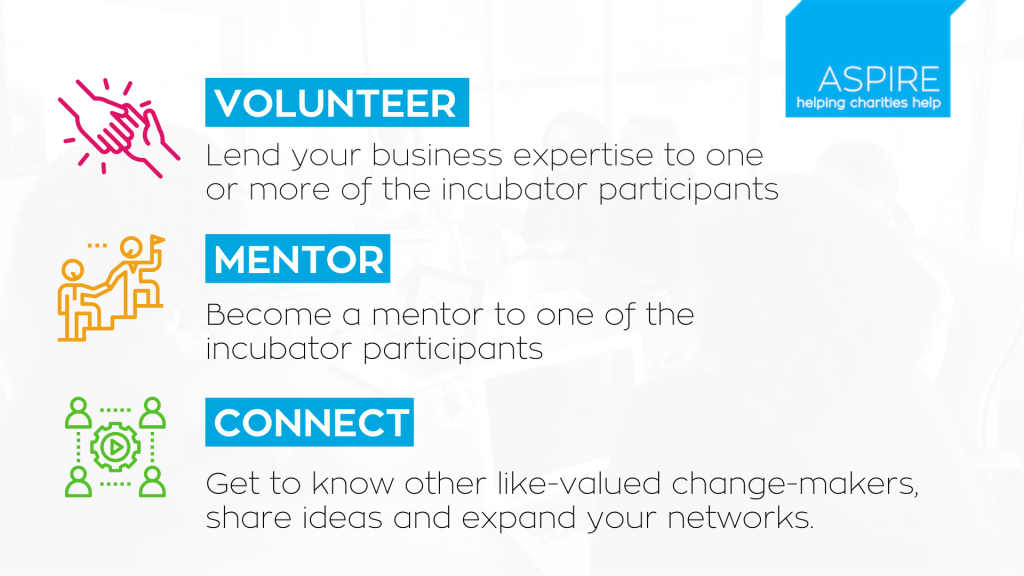
OUR PROGRAMME VOLUNTEERS
We could not do this without the volunteers, like yourself, who’ve all come on board and come alongside us to help build the organization, build the programme and to test this to ensure that it is working for the leaders.
The ASPIRE Incubator Programme is a 12-month business development fellowship for non-profits charities and social enterprises.
We aim to accelerate and enable solutions to some of the biggest social issues and challenges within the sector within Barbados and across the region. The programme, in addition to the business support that we provide, also provides certification in 6 core governance standards:
There are 3 tenants of the programme:
1.) Business support by volunteers
2.) Seed funding of maximum BDS$10,000 annually
3.) Certification
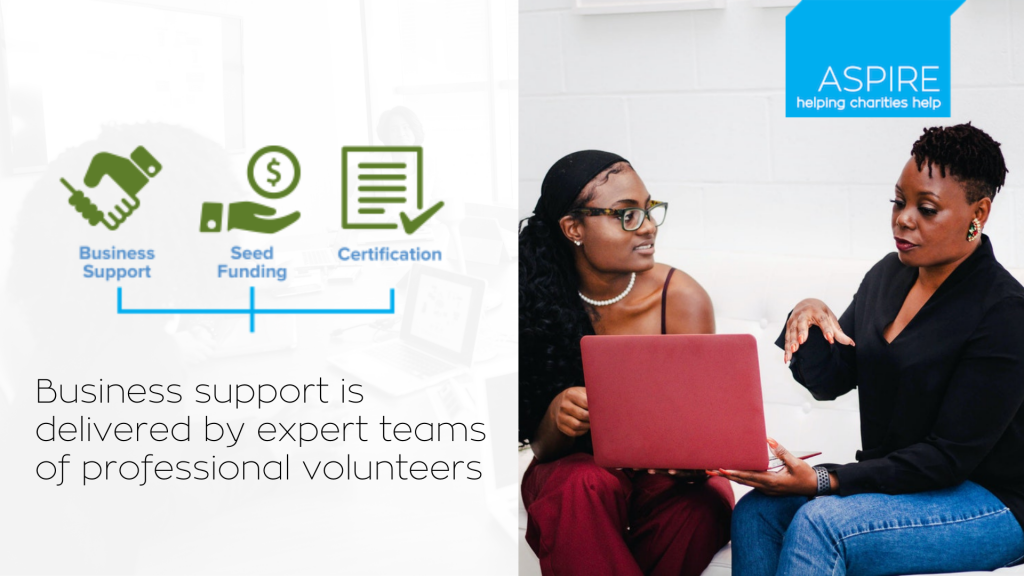
All of our support to the organizations, with the exception of the seed grant funding, is provided by volunteers.
These volunteers are all business leaders within the private sector, within the nonprofit sector and the government who have come together to help us build and develop this programme.
- They lend support and business expertise to one or more of our incubator participants.
- You can become a mentor of one of the incubators.
- We also connect with value-driven, like-minded change-makers to either volunteer directly with us or with one of our or organizations.
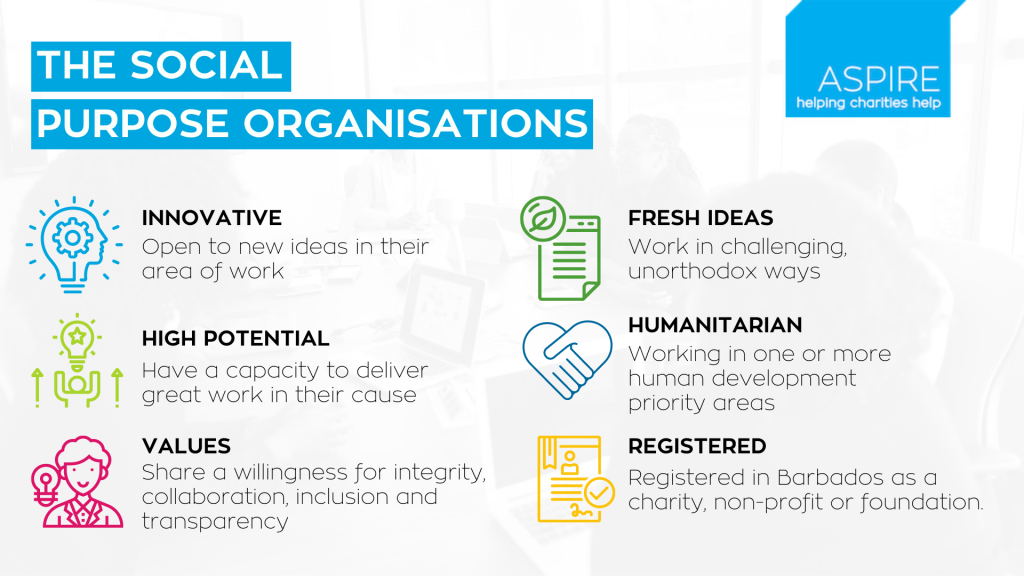
SOCIAL LEADERS AND ORGANISATIONS THAT WE WORK WITH
The social leaders that we have worked with are organizations who are innovative, so they’re open to working with new ideas in their areas of work. We work with organizations who have high impact potential and have the capacity to deliver great work for their cause; so they’re really seeking to make significant social change. These are all evidence-based in the areas that they work. They value the willingness for integrity, collaboration, inclusion and for transparency.
All of the organizations that we work with are registered organizations in Barbados. This is very important, as it helps to boost the trust within the sector, which is one of the issues that has been lacking within this sector. The standards which we developed are aimed at helping organizations to demonstrate their credibility and their efficiency.
We work with organizations who are seeking to create impact, seeking to measure their impact and working to help Barbados and the region achieve the 17 Sustainable Development Goals. These range from areas such as no poverty, zero hunger, good of health and well-being, education, etc.
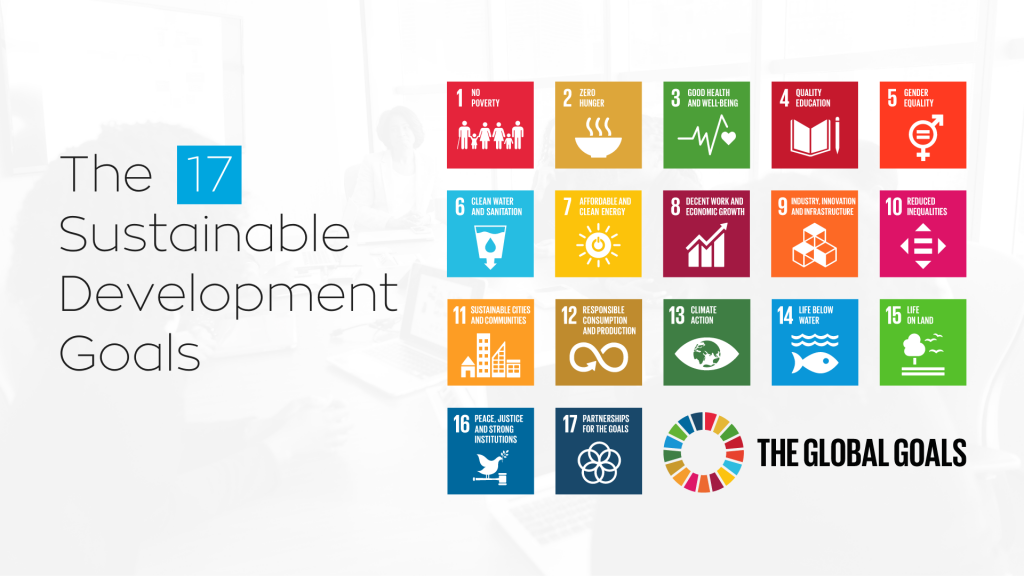
As we know, at this time, some of these issues that we have had over the years have skyrocketed with the prevalence of COVID. Within our spaces, our communities and communities of colour have been more highly affected by COVID. In addition to this is the issues around the shutdown and how that has impacted us economically, so the importance of non-profit organizations is even more integral right now for the survival of our communities. We’re seeking to accelerate the work that we have been doing with non-profits over the years and helping to accelerate The Sustainable Development goals.
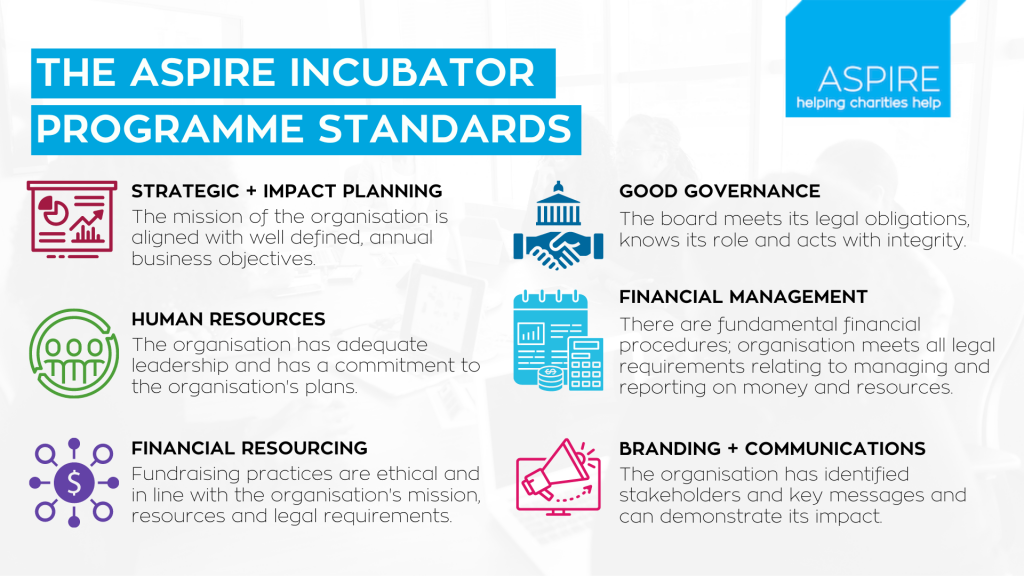
THE INCUBATOR PROGRAMME STANDARDS
We have developed standards in 6 core areas and these areas:
- Good Governance
- Financial Management
- Communications
- Business and Impact Planning
- Human Resource Capacity
- Fundraising.
In each of those areas we’ve developed a set of standards upon which the incubator is based. Our volunteers work with each of the clients to assist them to achieve those standards. Annually, we work with approximately 48 volunteers, who help provide these services.
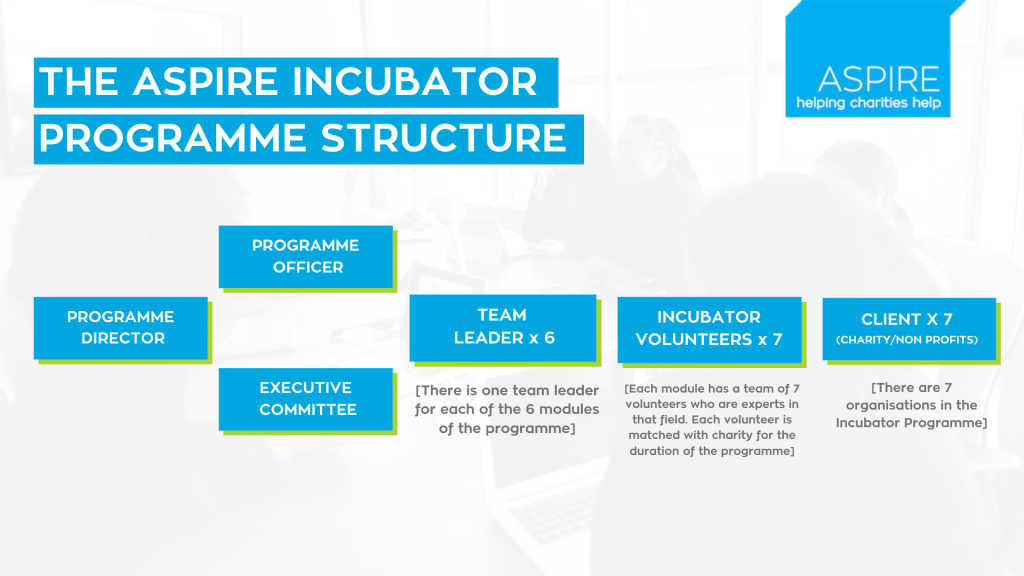
THE INCUBATOR PROGRAMME STRUCTURE
The programme is led by Fabianna Alexander as Programme Director.
We work with a team of business leaders. Each of these areas that we provide support in, each of the modules, has 6-7 volunteers who help provide that support to the clients.
Each team leader has a team.
We use a building blocks approach; whereby we start with Strategic and Impact Planning retreats and build upon each of those.
We move on to Good Governance and the business planning aspect.
Each ‘client’ (organisation) is paired with a volunteer in each of those areas.
We work with the client to help them meet the standards and fill in any gaps within the organization.
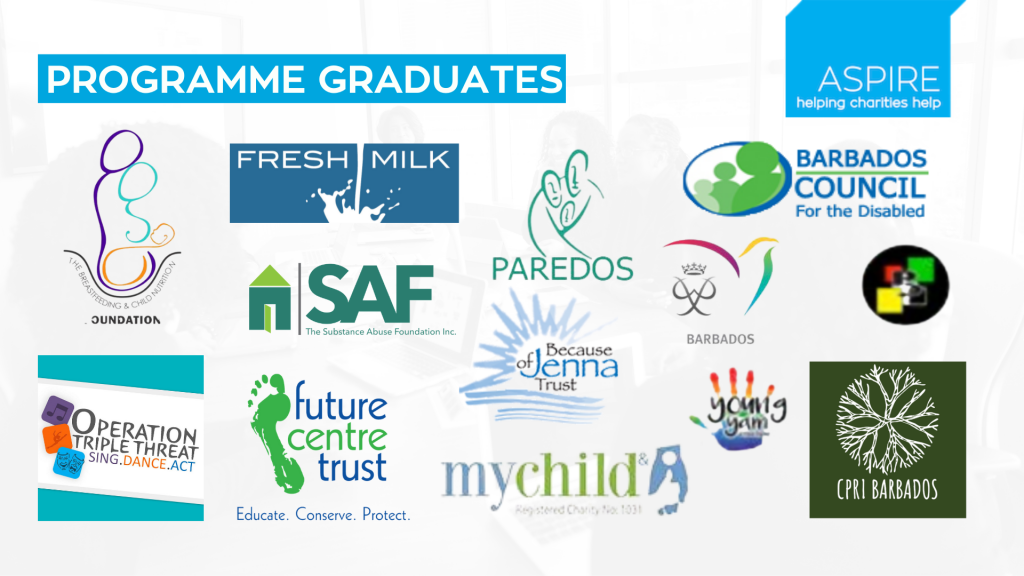
PROGRAMME GRADUATES
Over the years, we have worked with 14 organizations directly and we have 14 graduates of the programme. These organizations are:
- Because of Jenna Trust
- The Caribbean Permaculture Research Institute
- Fresh Milk Barbados
- My Child and I
- Operation Triple Threat
- The Future Center Trust
- The Duke of Edinburgh International Awards Barbados
- Better Birthing in Bim
- PAREDOS
- The Substance Abuse Foundation
- The Barbados Council for the Disabled
- The Breastfeeding and Child Nutrition Foundation
- Young Yam Creative.
We issued a call for applications in January 2021 and we can happily share that we have selected the next 7 organizations that we will be working with for the next year and a half. Stay tuned for an announcement soon! There’s a wide cross-section of organizations working in areas such as health, climate change, food food security, education, disability and human rights.
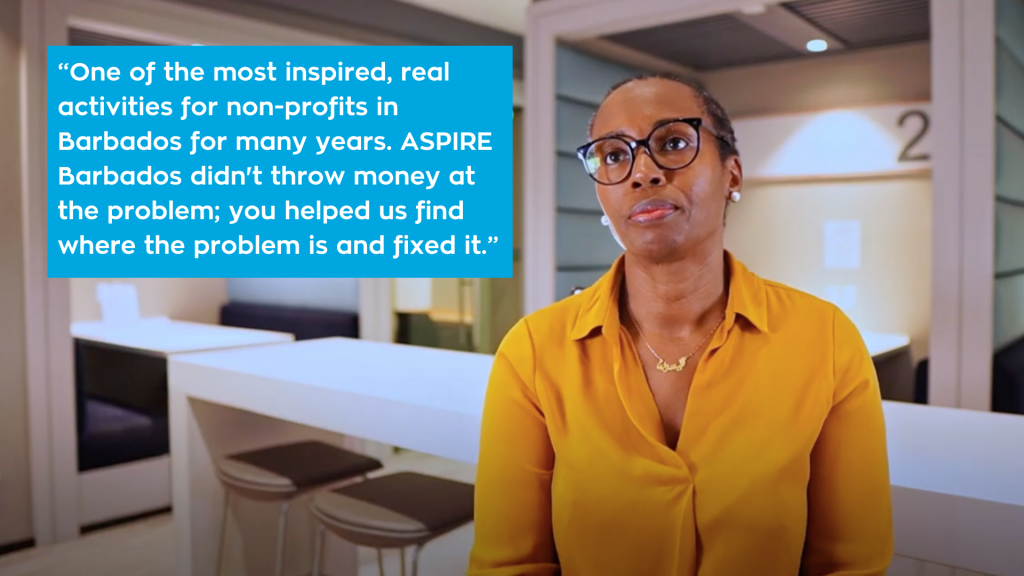

HEARING DIRECTLY FROM TWO OF OUR CURRENT ASPIRE INCUBATOR PROGRAMME VOLUNTEERS:
Ivan: I had a 30-year career with Barclays, which saw me working across most of the Caribbean countries and in London where I held administrative responsibility for and worked in the Barclays operations in Zimbabwe, Zambia, Kenya, Uganda, Seychelles and Mauritius before returning to the Caribbean as Retail Director for the Caribbean in The Bahamas. I was fortunate enough to be the Senior Caribbean person on the team that planned and oversaw the merger between Barclays and CIBC to form First Caribbean. I became a financial services consultant and I’ve continued on and off when my work with ASPIRE allows me to. I’ve served on the boards of three banking institutions including serving as the Chairman of the Bank of Nevis and the Bank of Nevis International.
Throughout my career, I’ve always sought to volunteer my services to non-profit organizations as a way of giving back to society. My association with ASPIRE goes back to 2016, when I was innocently driving home one Saturday morning and heard a radio chat show about ASPIRE and the need for volunteers with business experience. It seemed the perfect way to help those whose aim is to assist other people.
I started volunteering with Business and Strategic Planning. Within 6 months I found myself leading the pillar and I’ve enjoyed every movement of my ASPIRE experience. Passing all the skills I learned in the commercial arena to organizations in the Third Sector in order to help them strengthen their foundations and achieve greater impact. Speaking for the Strategic and Impact Planning Pillar, there’s clearly a difference between the strategies required for a non-profit with limited human and financial resources and a for-profit organization not under such constraints. We’ve had to change our templates and how we interact with non-profits on this basis, as we seek to guide them towards a strategy that gives them the most “impact for their buck”, as it were. Scarce resources should not be taken up on “nice to haves” or favourite projects but on those that have the greatest impact on the target population.
I have met many interesting, passionate and committed people through my association with ASPIRE and have derived immense pleasure and personal satisfaction from working with them and my fellow volunteers.
I cannot recommend serving as a volunteer enough, and I would certainly hope that those of you who are on the webinar today, who are considering joining us, do not let the opportunity pass you by you will not regret it!

Jeanette Barker: Like Ivan, I will just share a little bit about my experience with ASPIRE Barbados. I think it came to my attention via email if I remember correctly. I am someone who grew up around people who have always volunteered in various ways, both formerly via or organizations that you’d be familiar with like The Lions Club, but also informally within my family. So giving back is natural to me. I’ve grown up around it, I’ve seen it, it is something that I’m accustomed to doing. When I saw this opportunity, I thought it was a unique way to give back to civil society. It was very unique in that it was very specific towards the non-profit sector. Given my background, because I am actually a qualified accountant by training, I have been in the compliance space for the last 9 years.
I didn’t necessarily want to follow the Financial Controller track but Compliance has always interested me. I used to be an Auditor in my formative time. When I joined I actually worked at Ernst & Young when Mr.Boos was still a Country Managing Partner. So when I saw that he was involved in this organization, it was also a no-brainer for me, also having a background in hedge fund administration, when I lived in the Cayman Islands and then I came back here. I’ve been involved in insurance, working in insurance…but certainly financial services all of my life. I thought that the skills that I’ve gained over the years, that I could actually use those skills to help people and certainly in this particular pillar. I’m good at Governance.
What you will find is that, whereas in the for-profit sector people have a better understanding, may have a better understanding, of what is required in terms of when you’re dealing with corporate affairs etc., development of policies and procedures in the not-for-profit sector, sometimes the gaps are larger. So I thought it was a good opportunity. One of the things that I gained from working with the entity that I worked with, I found I was happy to share, they were willing to listen and I still share with them.
Even though the programme is for a particular period of time, I still have gone on to share with them subsequently. I’m always open to any questions or concerns that they have, and it is something that I found very rewarding. I used to meet with the organization I worked with, PAREDOS, on Friday evenings at the end of a long week.
I found when I walked away from those sessions, I always felt energized. That’s how I knew I was also doing the right thing for me and in terms of the help that I was giving them. That’s one of the big things, it is a time commitment but it is a rewarding time commitment where you can see that you can share your knowledge, you can see the application of it in a slightly different format or a different area and you can see change happening.
You can leave them with the blueprint, and as I said, you can develop a relationship where it is not just a finite thing. You may choose to continue to work with them post the incubation, the time allotted for the particular pillar, and that is one of the things as well I think that has allowed me to do and the way it is done it allows it’s given me that flexibility to also to continue to assist them where required.
I would encourage anyone if you’re serious, and if you want to do something a little different, but give back using your technical skills and any of the skills that you have, I think this is a good opportunity.
Also to network with other volunteers, because at one point in time, we all of the volunteers within the Governance Pillar, we did get to meet and interact with each other. So you got to know who was working with whom and you never know where it can go. but I certainly think in this space and in this time where i think NGOs are so required, there’s a lot of work to be done, and there are people out there who need the help and the guidance. I think it is a good opportunity to give back to society, to build the type of organizations that can then help us going forward, as we seek to improve what we do in the non-profit space here in Barbados.
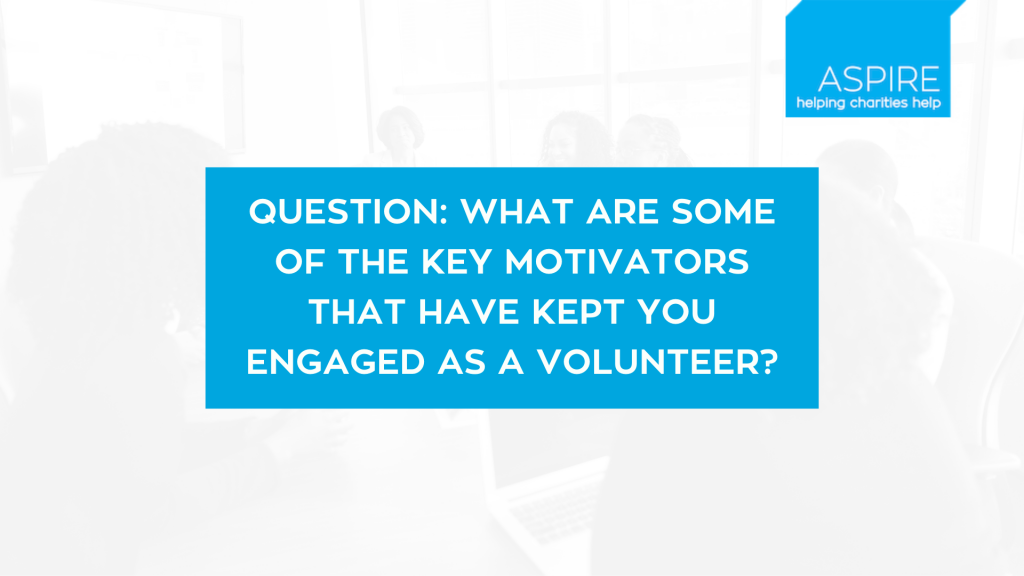
Ivan: I think that the advantage of being a pillar leader is you get to see more of the participants.
I found that it really is a way to help society. It’s a way to guide the organizations, to put them on a firm foundation. But you also get caught up with the passion; because the people who run these organizations are passionate. They are committed to the organization and it’s something that they pass on to you.
One of the organisations I was mentoring a couple of years ago, the Barbados Child Nutrition Foundation, I now work as their Secretary-Treasurer, because I was so enthusiastic about the organization and it felt like a real little family. I joined them on a sort of permanent basis on the board.
Throughout you get to meet these people who give up so much of themselves to help other people, that that you’re almost in awe of their commitment. It just forces you to get involved and to stay involved. When I sent the email after hearing the chat show on the radio, I did not envision that 5 years later I would still be here. I’m as enthusiastic as ever. It really has been a wonderful journey and long may it continue!

How are volunteers paired with the organisations in the programme?
Fabianna: Volunteers have an opportunity to identify if there’s a particular organization that you’re interested in working with. The pairing is done based on need and skillsets, in addition to a preference for the mentors and for the organizations. We want to ensure that at the end of the day it is a mutually beneficial relationship. So that all of our volunteers feel like Ivan and Jeanette; accomplished at having worked with with with us and with the clients. It really is based upon skill sets, based upon the need and based on the preferences if any is mentioned.
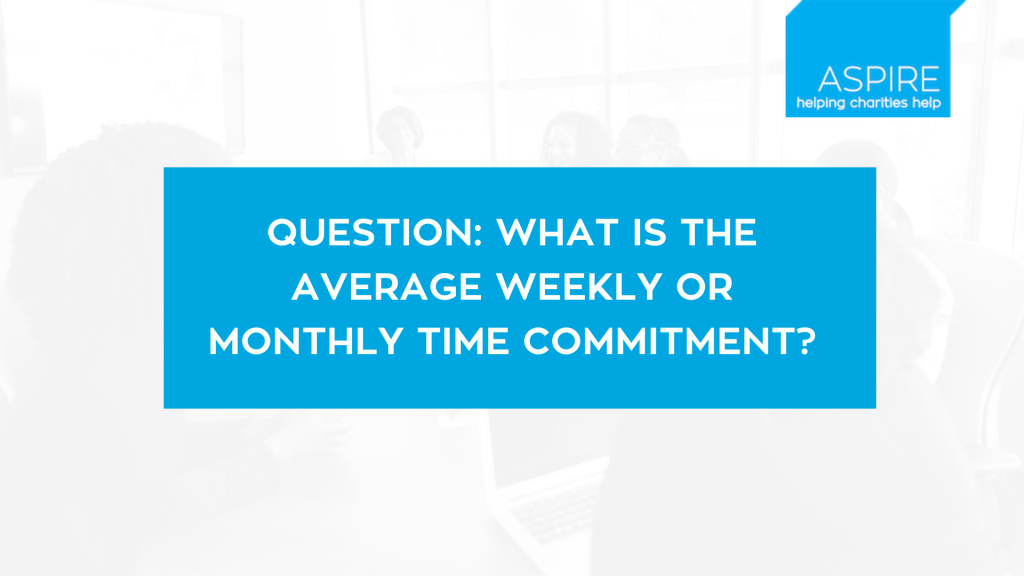
Fabianna: On average we will say approximately 2 hours per week. You work with the client that you paired with for a specific period of time. As I mentioned earlier, there is a building blocks approach. Each pillar works for about 2 months, where you will work with the client to meet the requirements for that pillar. Based on the assessment of the organization; where they are, what the needs within the organization may be, will also determine the amount of time that is required to meet with them. Generally, at most sometimes maybe 4 hours a week depending on the organization and the need. Maybe Ivan and Jeanette can say a bit more about for them, what that average time commitment has been while you were working with your pillar.
Jeanette: I think I can say on average it probably was about maybe 2 hours per week in terms of probably an hour, hour and a half, but about almost 2 hours of facetime with them. This was pre-COVID as well, so we actually met at the organization’s location and we would go through the steps and go through the various items that we needed to go through. I think that was done at that time, probably over about 6-8 weeks, but then there were other things that needed to be done. I have continued to provide support and have met with them intermittently since then. I also attended some of the events that they’ve held. It may not be from a time commitment as in certain other organizations, as long, but at the end of the day that it is also based on the relationship you develop with the organization as well, so it could vary, but I would say on a weekly basis in this in the initial period I would say probably about 2 hours per week.
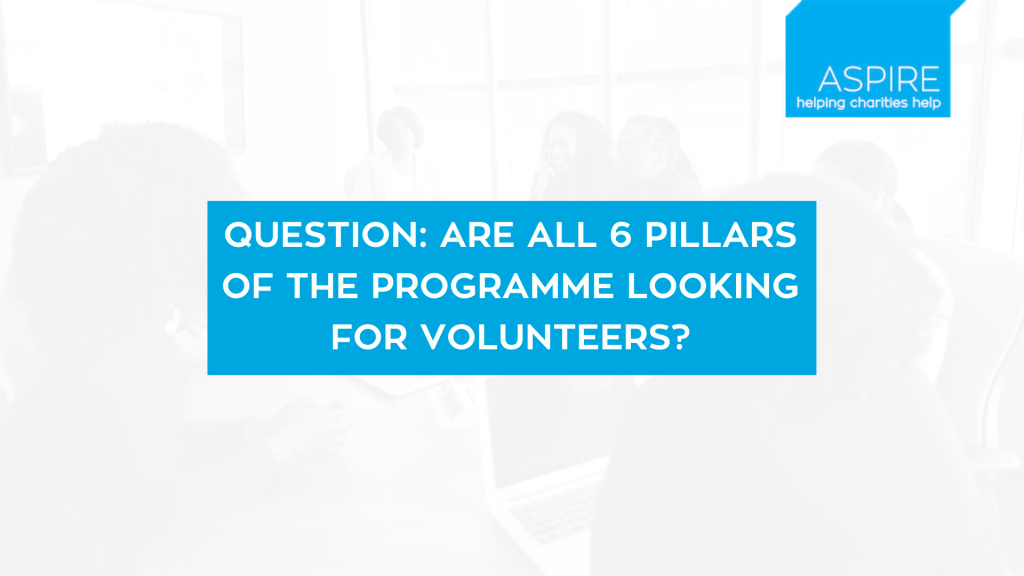
Fabianna: The answer to that is a firm YES!
Unfortunately, because of COVID, some of our volunteers are no longer able to volunteer. Some who have been with us for a long time. Whether it is increased demand on their time because of family commitments etc. Currently, we are looking for volunteers for all 6 pillars. We don’t necessarily need 7 for each pillar, but we are open to as many volunteers as possible. There’s also the opportunity to provide additional support to some of the clients on things that may not necessarily be specific to the Incubator. But there’s a need within the organization. If we can help meet those demands we do so as well. We always seek to have additional volunteers in case the need may arise.
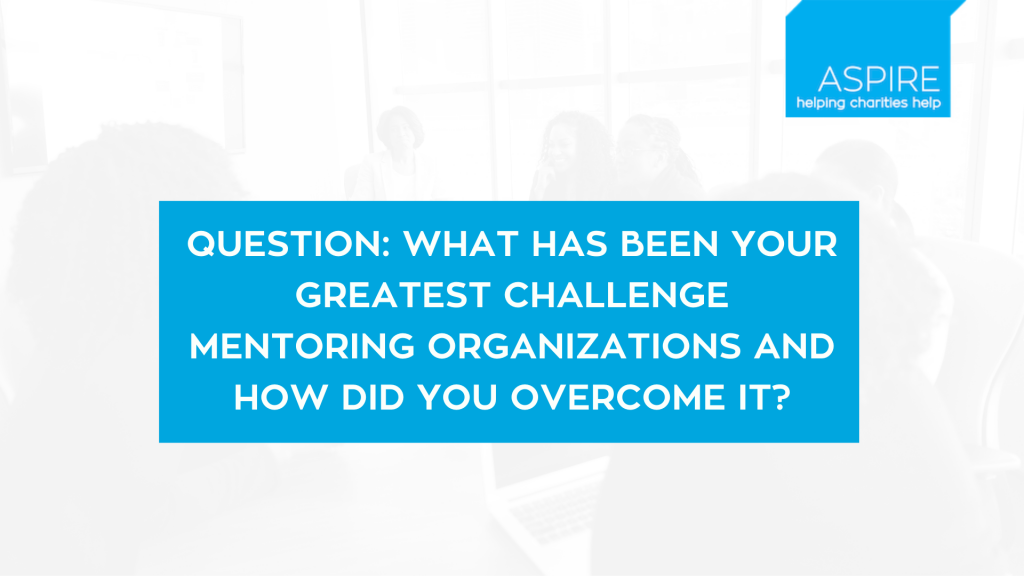
Fabianna: I’ll answer from an ASPIRE standpoint. In short, the biggest challenge is that most organizations depend very heavily on volunteerism, so that makes it incredibly difficult for persons to sometimes meet the demands.
It’s one of the reasons why there’s a lack of sustainability in this sector and what we are seeking to help organizations do is to move beyond the point of reliance solely on volunteerism but changing their funded models.
Thinking beyond the traditional sources of funding, thinking beyond project funding, thinking beyond simply seeking volunteers. Really looking at what, overall is the the big problem that they are seeking to solve.
- What’s the solution that they actually have and how they’re going to fund that?
- Are there services that they have that they can sell?
- Are there opportunities for them to generate income?
- Is there a social enterprise opportunity?
- Is there a business that they can build?
Thinking beyond the traditional grant funding, thinking beyond project funding and thinking about how are they going to grow their organizations. How are you going to build the organizations to really achieve sustainability? To really achieve the impact that they desire? Truthfully, that is the only way in which organizations can really grow.
When you think about it, there really is no successful business that does not have resources, that doesn’t have financial or human resources.
In order for an organization to really grow beyond just doing services for free, they really need to think about how you’re going to sustain the organization. What is the economic engine? What are the opportunities that may be available for persons to grow their organization? I’ll have to say that that has been one of the biggest challenges. It’s been getting people to think beyond that and in the first year that was a big challenge. It’s becoming easier, because of the mindsets have we’ve had to deal with helping individuals changing mindsets but that has been one of the biggest issues is around economic engines and how you’re going to grow and sustain the organization beyond short term.
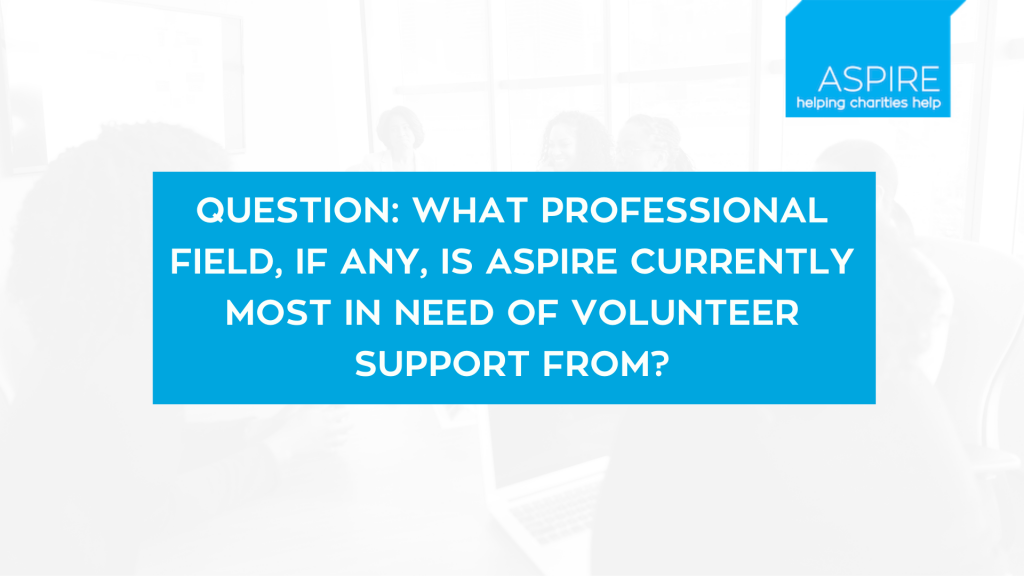
Fabianna: Two of the areas that have been most challenging in getting volunteers have been around what we call “Resource Acquisition”: Human Resources and Fundraising or ‘Capital’ Volunteers. Getting persons within those fields has been the most challenging in the 5 years that I’ve been working with the organization. Those two areas really are crucial in terms of sustainability. As much as an organization may have a brilliant idea, without the support, without the funding, without the human capital, it’s impossible to grow. Those are two of the areas that have been most challenging for us to get the number of volunteers that we’d want on an annual basis.
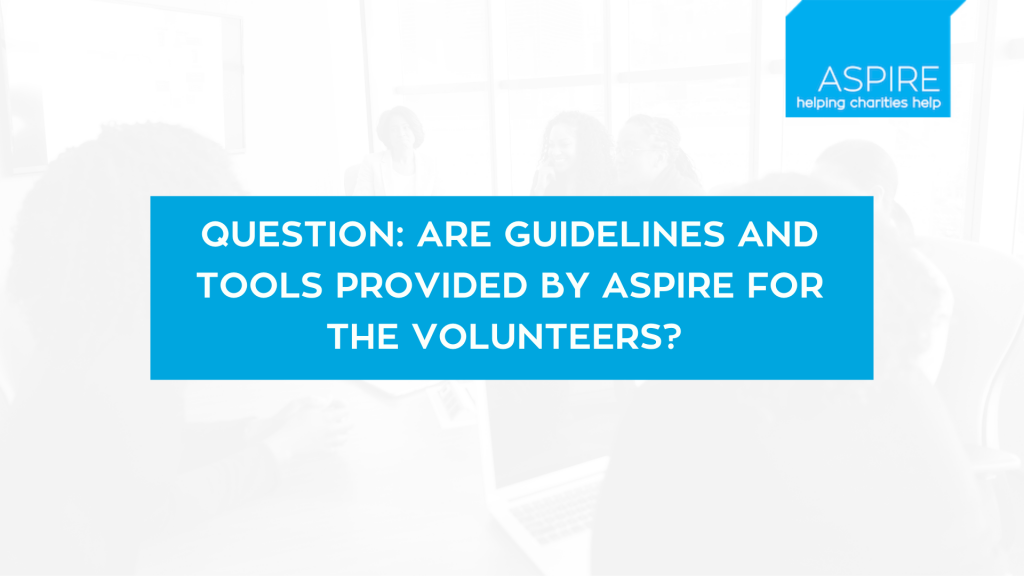
Fabianna: Absolutely!
The programme is based on the standards that we’ve developed for the sector locally. In addition to the standards, we have checklist templates, guidelines for volunteers, guidelines for the organizations to help guide the processes, and we are in the process of developing all that we have learned of the last 5 years into a fully-fledged toolkit for volunteers and our incoming cohort.
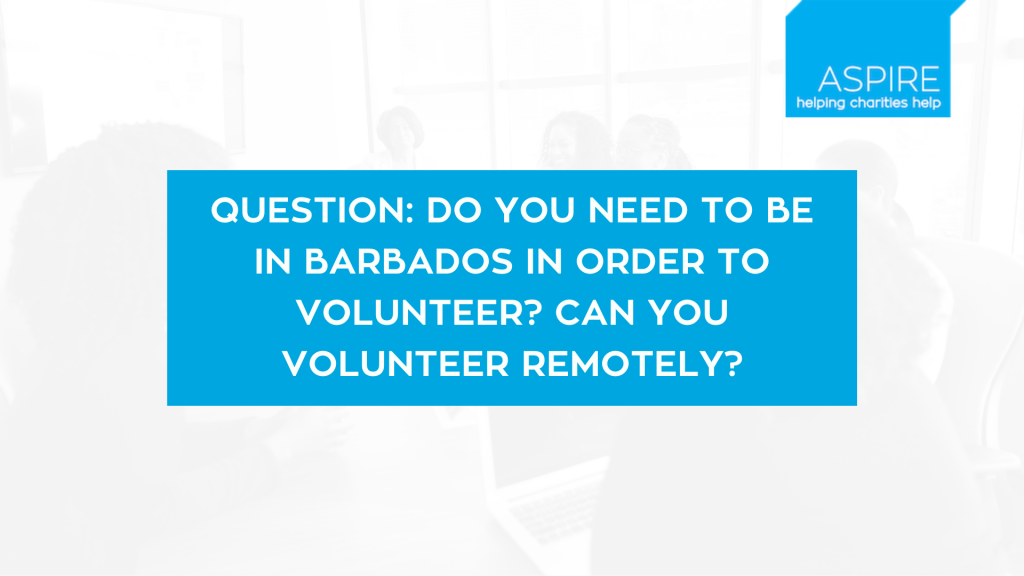
Fabianna: No, we work with volunteers who are physically in Barbados, as well as those who are not on the island. If 2020 taught us anything, it’s that we can accomplish a lot more than we thought possible thanks to technology. Having an appreciation for the challenges that Small Island Developing States such as Barbados face is a plus, but not necessary by any means. We appreciate and value the global perspectives and experiences of our volunteers.
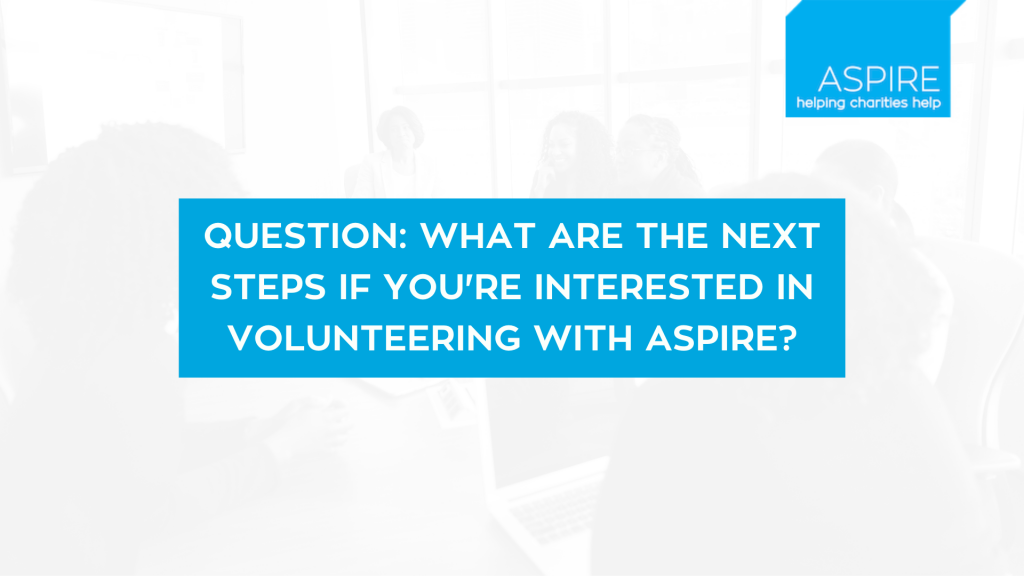
Fabianna: Brilliant question! We want to hear this!
The next step is to apply using our Volunteer Application Form.
We’re excited to hear from you. We’re available to answer any questions that you may have.
We will then schedule a call to discuss the details.
Thank you so much for joining us! We look forward to connecting with you further and we will share further information with you. Thank you to Ivan and Jeanette, for joining us today and sharing your experience. Thank you for all your support and the time that you’ve given over the years. It is much, much appreciated by us and by the clients who’ve been through the programme. Thank you, it’s really been a pleasure to present to you today. We look forward to hearing from you.
If you have any questions or comments feel free to reach out to the ASPIRE Barbados team admin@aspirebarbados.org
